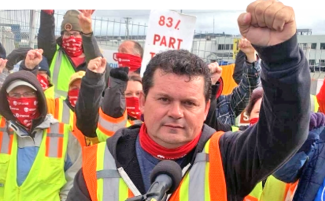SPLIT DECISION
Grocery workers proud of their effort despite strike outcome

“IT’S TOO SOON TO TELL.” That’s what the Chinese premier Zhou Enlai is supposed to have said in 1972 when asked who won the 1789 French Revolution. The same could be said about who won the recent grocery workers strike in Newfoundland and Labrador.
Fourteen hundred Unifor Local 597 members at 11 Dominion locations in Newfoundland walked off the job on August 22. They voted to approve a contract settlement 12 weeks later on November 13. The settlement delivered little in practical terms. The strike however delivered valuable reminders about the reality of a common desire to protect and promote fairness; along with examples of how to expand tactics to fight to win future battles.
Weak settlement; strong spirit
Covid-19 buying continues to burst the tills of Loblaw and all the other major grocers in Canada. Loblaw recently reported a record $342 million third quarter profit for 2020—a record $11 million more than the same time last year! But the corporation still will not agree to reinstate the $2 dollar per hour Covid-19 danger pay premium, or a $15 per hour basic pay rate—never mind any of the other smaller requests the Newfoundland workers want.
The contract the workers accepted includes pay increases starting at 35 cents an hour and going up to an extra $1.35 an hour by the end of the four-year contract. Also an assurance that 22 new full-time jobs will be restored. But those who lost full-time hours must reapply.
The new deal also includes a signing bonus—a PC gift card for employees, valued between $50 and $500, depending on their status and years worked for the company.
However, a disappointing outcome does not diminish the daring of the grocery workers. No other grocery workers ever took on an employer this powerful for so long.
The 1,400 workers went toe-to toe with Loblaw, the largest grocery corporation in the country, and its owner, Galen Weston Jr., the third-wealthiest person in Canada. No quarter was asked or given.
Secondary picketing strikes a nerve
As the strike settled into stalemate, workers turned up the heat. Pickets began spreading out, targeting other Loblaws-owned businesses in Saint John’s like No Frills. They also organized secondary pickets at a subsidiary Weston bakery and distribution centres in different parts of the country, like the massive Loblaws warehouse in Ajax, Ontario.
Secondary picketing cost the company big money, emptied some store shelves, and raised the strike’s profile. It was then that the Royal Newfoundland Constabaulary (RNC) volunteered to help the corporation. Without bothering to get an injunction the law requires, police showed up at the secondary picket lines threatening arrests.
With the police threatening violence, workers were advised to head home. They didn’t. They marched to police headquarters and protested.
“Our police have been reduced to doing the bidding of billionaires,” wrote Unifor rep Sharon Walsh after the RNC raid on grocery worker picket lines. “This is public funds protecting billionaires assets against minimum wage [workers].”
The provincial government appointed a mediator just days after the October 28 police raid on union picketers.
The union agreed to put a “final offer” to the membership on November 7. Voting lasted through the following week. That same week, Loblaw announced that their profits where up again—beating their own rosy expectations for the third quarter of 2020 (July-September).
On November 13, Unifor announced the members had accepted the final offer. Many were disappointed.
Ready to fight on
“I’m feisty,” says Local 597 member Shannon.* “I was one that wanted to stay and fight.”
“But [mostly] everybody was up for the fight and walking the picket line and showing support,” says Local 597 member Brittany.*
“I think that brought us a lot closer together as a group with the students and the older people, the full-time. It definitely brought us all together.
“A lot of people actually [came] together and [showed] support for each other, and you know what, on our picket line everybody fought for everybody else.”
The strike also showed the advantages of secondary picketing. “It definitely opened a lot of people’s eyes of the community and staff that worked there,” says Britttany.
Secondary pickets take strikes away from specific workplaces and out into the broader community. It’s why they’re considered illegal in many provinces and subject to injunctions.
Shannon says, “I think we should’ve stayed on the secondary picket lines.”
Shayne Fields, worked at the Loblaw distribution centre in Ajax and helped organize one of the secondary pickets outside of Newfoundland. He is incoming president of Unifor Local 222, in Oshawa.
Fields says the “mindset” of the managers in Oshawa and Newfoudland is the same. “I’ve done three sets of negotiations with them, and I know what the workers in Newfoundland were up against.”
Fields makes this simple observation: “We show the strength of the union when we withdraw our labour and we shut them down.”
*False names are used to protect workers from possible employer reprisals.
- 30 -













Add new comment